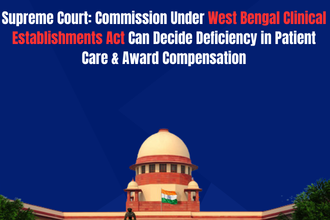A fresh intervention before the Supreme Court has raised serious constitutional concerns regarding the Madhya Pradesh Sudharatmak Sevayen Evam Bandigrah Adhiniyam, 2024, arguing that the law disproportionately harms Denotified Tribes (DNTs) by using a vague and arbitrary definition of “habitual offenders.” The intervention was allowed by a bench comprising Justice JB Pardiwala and Justice Viswanathan on October 31, 2025, in the ongoing suo motu proceedings titled In Re: Discrimination Inside Prisons in India.
The intervenor, Criminal Justice and Police Accountability Project, represented by Senior Advocate Aparna Bhat, contended that the new Madhya Pradesh prison legislation violates the directions issued in the landmark Sukanya Shantha judgment (2024). In that ruling, the Supreme Court recognized systemic discrimination inside Indian prisons, especially against marginalized groups including denotified tribes, lower caste prisoners, women, and persons with disabilities.
Background: The Sukanya Shantha Judgment (2024)
In Sukanya Shantha v. Union of India (2024), the Supreme Court acknowledged that prisons in India are not neutral spaces, but ones where caste, community, gender, and socio-economic status directly influence treatment, punishment, segregation, and access to legal rights.
A significant part of the judgment focused on the historical criminalization of Denotified Tribes, who were once branded as “criminal tribes” under British rule. Though the Criminal Tribes Act was repealed, the stigma persisted through terms like “habitual offenders” in state prison manuals and preventive detention laws. The Court expressly held that such terminology cannot be used except in strict accordance with statutory safeguards, and any vague or stereotype-based classification would be unconstitutional under Article 15(1) and Article 14.
Key Argument: MP’s Definition of “Habitual Offender” Is Void for Vagueness
The Madhya Pradesh Sudharatmak Sevayen Evam Bandigrah Adhiniyam, 2024 defines a habitual offender as:
“prisoners who are sent to prison and correctional institutions repeatedly for their crimes.”
The intervenor argued that this definition is:
- Vague and expansive
- Allows high discretion to prison authorities
- Creates room for stereotyping
- Directly affects Denotified Tribes, who are historically over-policed and wrongly labeled as habitual criminals
(often just on suspicion, not proven convictions)
The Supreme Court had earlier cautioned that vague state laws allow arbitrary police targeting, which leads to over-incarceration of marginalized communities.
Section 6(3): Segregation of “High-Risk” Prisoners
Section 6(3) of the Act states that each prison must maintain separate wards for:
- High-risk prisoners
- Recidivists
- Habitual offenders
This, the intervenor argued, collapses distinct prison categories into one uniform label, which is not based on any reasonable or constitutional classification. Under Article 14, only persons similarly situated can be treated alike. By grouping prisoners with different circumstances and backgrounds into a single segregated category, the law operates discriminatorily.
Section 27(2): Classification System Criticized
Section 27(2) empowers a classification committee to sort prisoners based on:
- Civil offenses
- Criminal offenses
- Detention status
Within this, habitual offender status becomes a factor for sub-classification. Since the habitual offender category is already vague, its application further intensifies risk of discriminatory labeling, especially for communities historically over-surveilled, such as DNTs.
Section 28: Denial of Parole and Furlough
The intervenor has particularly challenged Section 28, which authorizes:
- Special “preventive measures” for habitual offenders
- Prison surveillance based on “background records”
- Denial of parole and furlough to habitual offenders
This is a direct violation of constitutional rights because:
- Parole and furlough are not privileges, but extensions of the right to life and dignity under Article 21.
- Denotified Tribes, due to biased policing data, are more likely to be classified as habitual offenders, meaning the law disproportionately restricts their personal liberty compared to other prisoners.
The provision also permits ongoing surveillance, extending discrimination even after release, effectively continuing colonial patterns of “criminal tracking” of DNTs.
Section 29: Prison Surveillance Provisions Challenged
Section 29 authorizes surveillance of high-risk and habitual offenders, which again has a disproportionate impact on Denotified Tribes, replicating tactics used under the criminal tribes regime.
This allows the state to:
- track movement
- monitor associations
- interfere with resettlement and rehabilitation
Such monitoring stigmatizes released individuals, harming their ability to rebuild life, secure employment, or reintegrate socially.
Why This Matters: Constitutional and Social Significance
This case has major legal and social implications, including:
- Protection of Article 14 (Right to Equality)
- Enforcement of Article 15(1) (Non-discrimination based on caste)
- Preservation of Article 21 (Right to Dignity and Personal Liberty)
The central constitutional question is:
Can the State use vague criminal labels to justify unequal treatment of historically marginalized groups?
If the Supreme Court finds the MP Prison Act unconstitutional in its current form, it could set a national precedent regulating prison laws, criminal surveillance practices, and classification systems across India.
Conclusion
The Supreme Court’s decision to entertain the intervention is a significant development in the fight against institutional discrimination inside prisons. The challenge highlights how vague legal terminology, when mixed with historical social prejudice, can lead to systemic abuse of marginalized communities, especially Denotified Tribes.
The Court has now asked the intervenor to file a substantial directions application, indicating that further judicial scrutiny is expected.
This case may well shape the future of prison reform and constitutional equality in India.
Also Read
Supreme Court Confers Senior Advocate Designation on Five Retired High Court Judges


